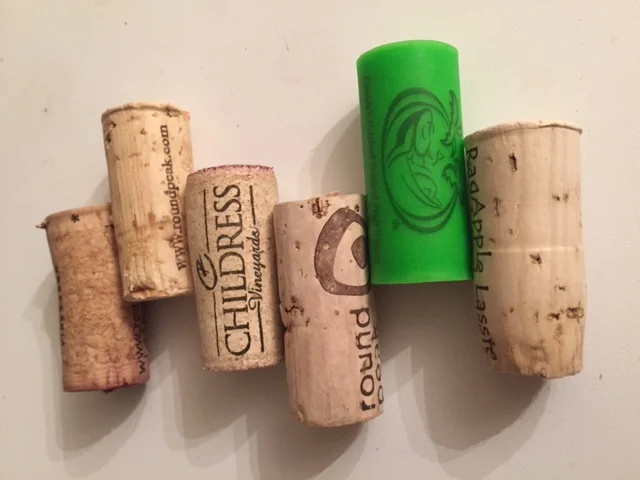Corks and Closures
We all know about corks, but did you know the numerous other ways to close a bottle of wine? There are so many! Here are my four favorite with their pros and cons.
Traditional Cork: Who doesn't love tradition? When you are safely in your house and want to bust out a wine with a corkscrew handy, a cork is nice. A cork symbolizes class and being fancy. And you can also craft with them (#priorities). There is this problem with corks when you don't have a proper corkscrew, though. Like, when you are traveling in Italy in a train with no corkscrew (we resulted to pushing the cork inside the bottle), or when you only have a dinky corkscrew and you literally spend hours camping digging out a cork, piece by piece. The price we pay for our wine, folks! Another issue is this thing called Cork Taint. I'm sure you noticed someone smelling a cork before - well this is what they are checking for. When there is a small percentage of it affecting your wine, it will smell like yucky wet cardboard. Cork Taint, or TCA, is a problem in the winery and can be caused by using bleach products. I love bleach and douse my house in bleach constantly, but I have learned that bleach has no place in a winery, lest we have wine smelling of wet cardboard. So if you are a fan of tradition or crafting, choose cork.
Synthetic Cork: A synthetic cork looks like a cork to the average person, so you can get by with this one. It has similar characteristics to cork as above, but really if you want to be hip and suave I wouldn't choose synthetic. Either go big or go home, I say. But in reality a synthetic cork works just fine, and doesn't have a tendency to break on you. If you are new to wine, or opening wine, you may want to practice on synthetic corks, lest you want to pick pieces of cork out of your wine.
Screw Cap: Let's be real, the biggest draw back to a screw cap is that you cannot fill your wine-cork-holding-vessel with screw caps. That being said, I LOVE screw caps. It means I can take wine anywhere! The possibilities become endless. A friend's house, yes; camping, even better; floating down a river in a tube, perfection. The one downside is that wine with a screw cap is not getting any air, unlike corks that do allow a slow microoxygenation (similar to an oak barrel). For wine you want to keep, don't look to a screw cap. For a wine you want to buy and drink within a month, there is no issue with a screw cap for quality.
ZORK: Think I'm kidding? Try a Pepperwood Grove (you can find this in the grocery store) and you will see what a Zork is. This is the only wine I've seen like this, so you may have a difficult time running into this one. If you do though, your mind will be blown. Think of a screwcap meeting a cork. You screw off the plastic (similar to the ring you pull off around a gallon of milk) and then you pull out the sort of cork stopper (like a port wine stopper). It has the benefit of being reused as well. You can just keep this sucker to close all your wines. A win-win really.
http://zorkclosures.com/
Hopefully you are now enlightened as you open up your favorite bottle and quickly throw away the cork or closure (because who really reseals a bottle?). Cheers!






